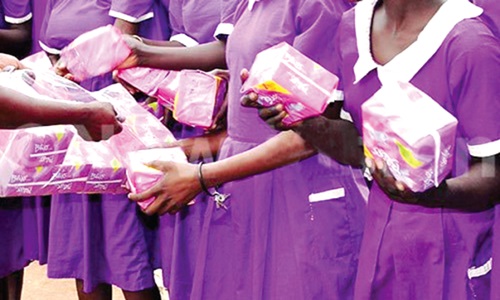In a significant stride towards addressing one of the most pressing challenges girls face in Ghana, the government has allocated GH₵292.4 million in the 2025 budget for the Free Sanitary Pad Initiative (FSPI), to support girls in both primary and secondary schools.
As the National Membership Development Commissioner of the Ghana Girl Guides Association (GGGA), I would like to commend this bold and much-needed move, which is set to have a positive and far-reaching impact on the education and well-being of girls nationwide.
This initiative marks a critical moment in our collective efforts to ensure that every girl in Ghana has equal access to education, irrespective of the economic challenges that may hinder her progress.
For far too long, many girls in rural and impoverished communities have faced the painful dilemma of choosing between menstrual hygiene and continuing their education.
A lack of access to sanitary products has forced countless girls to miss school during their menstrual cycles, affecting their academic performance, self-esteem and future opportunities.
Furthermore, in some communities, it is considered taboo for a girl who is menstruating to cross certain streams and rivers on her way to school.
These cultural barriers further complicate the education of girls, often leaving them with no choice but to stay at home during their periods.
The government's commitment to providing free sanitary pads for school girls is, therefore, an important step towards breaking down these barriers.
Role of menstrual hygiene in girls’ education
Menstruation is a natural and healthy part of life.
However, in many parts of the world, including Ghana, it is often surrounded by stigma and taboo.
This stigma, combined with economic hardship, means that girls are sometimes forced to endure the shame and discomfort of lacking proper menstrual hygiene products.
The inability to afford sanitary pads and other hygiene products has led to a phenomenon known as ‘period poverty,’ which disproportionately affects girls from low-income households.
Many girls find themselves in embarrassing situations at school, subject to ridicule and bullying, which negatively impacts their self-confidence.
The consequences of this issue are dire. Research indicates that many girls miss several days of school each month due to menstrual-related challenges.
This missed time translates into significant gaps in learning, adversely affecting their academic performance, and in the worst cases, leading to school dropouts.
This problem is even more pronounced in rural areas, where access to sanitary products and education about menstrual health is severely limited.
The government's introduction of the FSPI directly addresses this pressing issue.
By providing sanitary pads to girls in primary and secondary schools, the initiative ensures that no girl has to choose between maintaining her dignity and accessing her right to education.
This simple yet profound act of support communicates a strong message about the importance we place on girls' education and the need to enable every girl to unleash her fullest potential without unnecessary obstacles.
Breaking the cycle of poverty
Providing free sanitary pads does more than allowing girls to attend school without fear of embarrassment or discomfort.
It plays a critical role in breaking the cycle of poverty.
When girls miss school due to menstrual issues, they fall behind academically, further diminishing their chances of completing their education and pursuing economic independence.
Education, particularly for girls, is a vital component of breaking the poverty cycle.
By helping girls remain in school, the FSPI initiative empowers them to make informed decisions about their futures, contribute meaningfully to society, and address the gender disparity that persists in various sectors of the Ghanaian economy.
It represents an investment in Ghana’s future, promising long-term benefits for the nation as a whole.
Role of the Ghana Girl Guides Association (GGGA)
The GGGA understands the critical importance of supporting young girls and empowering them to lead with confidence and character.
Our organisation has always been at the forefront of promoting girls’ education, leadership and empowerment.
We are thrilled to witness the government taking such a proactive stance in addressing the barriers that prevent girls from unleashing their fullest potential.
With the government’s support of this new initiative, we are motivated to expand our efforts and collaborate with stakeholders, including community leaders and faith-based organisations, to ensure that girls across Ghana have access to the resources they need to succeed.
Conclusion
In conclusion, the FSPI is a progressive and necessary step forward for girls.
However, we must continue to tackle the cultural taboos surrounding menstruation and work collaboratively with all stakeholders, including the government, relevant ministries, traditional leaders, civil society, and faith-based organisations, to address these issues.
We must ensure that no girl is left behind, and that every girl can pursue her education with dignity and confidence.
Together, we can empower girls to overcome societal barriers to benefit not just themselves, but our communities and nation as a whole.
* The writer is the National Membership Development Commissioner of the Ghana Girl Guides Association

